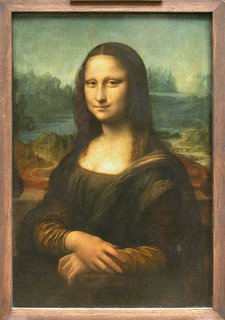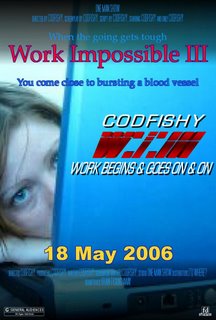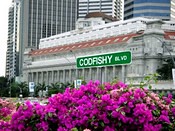Davinci Takes Me on a Rollercoaster Ride
Have heard about how "The Davinci Code" has caused much controversies, especially within the Christian community, so when my friends asked me along to watch the movie, I thought: Why not since it was in the spirit of entertainment and finding out just what this story is really all about to be causing so much unroar (I have yet to read the book) ...
A Rollercoaster Ride
Never would I have expected that a movie could have thrown me into a "rollercoaster ride":
- I could be at one point of the movie feel extremely angry with the claims which attacked the Christian faith and yet at another point feel like a fool as if we, as Christians, are living in the shadow of a possible lie...
- I could be at one point of the movie be wary of the claims made; sometimes dismissing it as heresy and yet at another point trying to be all sociological and objective in evaluating the facts being put forth (since I am trained the sociology)...
Disclaimer
I would be lying if I told you that my faith has not been shakened at all by the movie. I left the movie with more questions, but mainly questions about "The Davinci Code" and its claims. I decided that I wanted to blog about these thoughts and questions I have about the movie. I do not profess that I know enough to draw a conclusion about who is right and who is wrong (especially since I have not even read the book). I am also no bible nor history scholar so I won't attempt to use biblical or historical facts (some of which are being challenged) but nonetheless want to make sense of the movie...
What was on the Author's Mind when writing "The Davinci Code"?
One of the fundamental questions was this: What was Dan Brown thinking about when he wrote "The Davinci Code"? What is/are his intention(s)? We are often quick to judge others (myself included) without first trying to understand their intentions; only by understanding intentions can we better appreciate the value of something.
In the same way, when trying to make sense of "The Davinci Code", it would help to understand the intentions behind this piece of work. It would not be fair to judge "The Davinci Code" without knowing much about the intention(s) for writing it. Perhaps, it was meant to just be a piece of work to entertain or something else. Unfortunately, the author does not reveal much about this. On his website, he called
"The Da Vinci Code is a novel and therefore a work of fiction. While the book's characters and their actions are obviously not real, the artwork, architecture, documents, and secret rituals depicted in this novel all exist" (link).It becomes unclear whether "The Davinci Code" seeks to be an entertaining piece of work or a piece of work which serves to reveal a conspiracy. But he does goes on to say
"My hope in writing this novel was that the story would serve as a catalyst and a springboard for people to discuss the important topics of faith, religion, and history" (link).Being a historical fiction (defined by The Da Vinci Code: Separating Fact from Fiction (RBC Ministry, 2005:8) as "a genre of literature in which imaginery characters live within the realistic boundaries of known facts", "The Davinci Code" is a clever blend of fiction with known history and famous people so much so it becomea difficult to separate fact from fiction. The fact that it involves famous people like Leonardo da Vinci and Victor Hugo in a supposed conspiracy and challenges the religious identity of adherents of the largest world religion and one's gender identity... it just makes the movie all the more "juicer"...
When asked whether the book is anti-christian, Dan Brown responds
"No. This book is not anti-anything. It's a novel. I wrote this story in an effort to explore certain aspects of Christian history that interest me." (link).What is Dan Brown's Faith?
Since this story puts to challenge the Christian faith, it would also be natural to also wonder what Dan Brown's faith (if any) is... On this, he says:
"Yes. Interestingly, if you ask three people what it means to be Christian, you will get three different answers. Some feel being baptized is sufficient. Others feel you must accept the Bible as absolute historical fact. Still others require a belief that all those who do not accept Christ as their personal savior are doomed to hell. Faith is a continuum, and we each fall on that line where we may. By attempting to rigidly classify ethereal concepts like faith, we end up debating semantics to the point where we entirely miss the obvious--that is, that we are all trying to decipher life's big mysteries, and we're each following our own paths of enlightenment. I consider myself a student of many religions. The more I learn, the more questions I have. For me, the spiritual quest will be a life-long work in progress." (link)When asked about his facination with secret societies, he says:
"My interest in secret societies is the product of many experiences, some I can discuss, others I cannot. Certainly my research of organizations like NSA, the Vatican, NRO, and Opus Dei continues to fuel my intrigue. At a more fundamental level, though, my interest sparks from growing up in New England, surrounded by the clandestine clubs of Ivy League universities, the Masonic lodges of our Founding Fathers, and the hidden hallways of early government power. New England has a long tradition of elite private clubs, fraternities, and secrecy." (link)How does Dan Brown know what he knows?
How does Dan Brown know what he knows? Does Dan Brown have privileged access to information? Claims are made on something that has happened a real long time ago so is the source itself credible and reliable? How do these sources compare to other sources?
One of the most important group of people in the story is the Priory of Sion, which has for centuries guarded a secret, which became the theory at the heart of "The Davinci Code"; that Jesus Christ married Mary Magdalene and today their descendants are living in France (link). According to The Da Vinci Code: Separating Fact from Fiction (RBC Ministry, 2005:10), the title "Priory of Sion" has been used three different times in history: The first a monastic order founded in Jerusalem in 1100 that was later absorbed into the Jesuits in 1617, the second and third referred to the group under the leadership of Pierre Plantard (1920-2000).
According to Wikipedia, the Priory of Sion was founded in 1956 but was dissolved sometime after October 1956 but the name came up on paper again intermittently between 1962 and 1993 although it was considered by the Sub-Prefecture of St. Julien-en-Genevois (where Priory of Sion was registered in 1956) as "dormant" with no activities since 1956.
"Between 1961 and 1984 Plantard contrived a mythical pedigree of the Priory of Sion claiming that it was the offshoot of the monastic order housed in the Abbey of Sion, which had been founded in the Kingdom of Jerusalem during the First Crusade and later absorbed by the Jesuits in 1617. The mistake is often made that this Abbey of Sion was a "Priory of Sion", but there is a difference between an abbey and a priory. Calling his original 1956 group "Priory of Sion" undoubtedly gave Plantard the later idea to claim that his organisation had been historically founded in Jerusalem during the Crusades when meeting the author Gérard de Sède during the early 1960s - this fabrication by Pierre Plantard was part of his literary deal with de Sede when they began collaborating during the early 1960s in a series of published books." (link)Then in 1960s and 1970s, he created a series of forged documents to prove that he is in the bloodline of the King of France. He and his associates then deposited these documents in libraries all over France, including the National Library but in 1993, he admitted under oath that he had fabricated the documents (RBC Ministry, 2005:10-11). Also see "The Priory Of Sion
Is The "Secret Organization" Fact Or Fiction?" by CBS (link) and the Wikipedia article on the Priory of Sion (link).
Even though the Priory of Sion really do exist, how does this compare to religious text of the 2 largest religions in the world: Christianity (with 2.1 billion adherents at 2005) and Islam (with 1.3 billion adherents at 2005) (link). Even though there are ideological differences in both religions, there still contain similarities between both the bible and the koran (link). There was no mentioned that Jesus was married in the bible and also in the koran:
"Yet, there is no mention whatsoever of the marriage or a wife of Jesus...Crazy Hypothesis
On the other hand, relatively more details of the biography of Jesus are found in the four Gospels and other writings of Paul, John, and Peter in the New Testament, including his genealogy (more precisely that of Joseph the carpenter, the claimed fiancé of his mother), the names of his disciples, and also some of his relatives. Yet again, no mention whatsoever is there of a wife. Hence, with the information and sources at hand, we can conclude that, most probably, Jesus did not marry. This is in harmony with the character and message of Jesus. He came to correct the deviation of Judaism from pure monotheism and divine guidance to a materialistic approach to life, a superficial approach to rites and hard-hearted application of law. So, Jesus emphasized the purification of heart and soul, and the revival of the true essence of belief, rites, and law. For the prevailing materialistic world he came to guide, his life was a model of asceticism and turning away from material desires. This gives further weight to the belief that Jesus did not marry." (link)
OK let me be bold and come up with a few crazy hypothesis to consider the possibilities...
Scenario 1: "The Davinci Code" is a compelling novel that cleverly weaves together historical events and famous people into a compelling conspiracy; one with many twists and which keeps readers and movie-goers on the egde of their seats. As such, the possible motivations for "The Davinci Code" would include reasons such as writing for income, self-actualization and personal interest.
Scenario 2: "The Davinci Code" has been used as a tool in response to disgruntlement with the Christian faith especially since Opus Dei (clearly representative of the Christian faith) has been portrayed in the story as the "baddie", going around silencing others to keep an age-old secret, which has worked for their interests. In this case, the possible motivation for "The Davinci Code" would be for "revenge".
Scenario 3: "The Davinci Code" is a tool to reveal the truth. In this scenario, the author is a member of the Priory of Sion and just as other members of the Priory of Sion eg. Leonardo da Vinci, have left clues to the secret, so is the author attempting to reveal the "truth" (as in the story). Another possibility might be to disillusion people and have them buy the ideology of the Priory of Sion. However, to date, we have not seen the Priory of Sion coming forth to "claim" these disillusioned people, at least not that I know of.
However, something is still not very clear to me: Did the Prior of Sion (as in the story) exist to protect the secret of reveal the secret? If the Priory's aim is to protect the secret, then won't there be a balance between what the Opus Dei wants and what they Priory of Sion wants? Unless of course, someone decides to upset the balance e.g. Opus Dei trying to eliminate all traces of the secret including silencing all who knows the secret or a third party (neither from the Opus Dei and Priory of Sion) used both to gain access to the secret, thereby turning both against each other. This was exactly what happened in the story in which Sir Leigh Teabing (also "The Teacher") made use of the Bishop of Opus Dei to help him find the location of the Holy Grail. If indeed Priory of Sion was to protect the secret of the Holy Grail then members such as Leonardo da Vinci and even the author would have gone against the objects of the group by revealing the secret.
Hence, the motivation in this case would be to reveal the "truth" as it is known in the story. But, has the secret of the Holy Grail been found?
4. Scenario 4: "The Davinci Code" is used as a tool of mockery. Just as Karl Marx has argued that religion is the opiate of the masses, used to control them, so is "The Davinci Code" trying to make a statement that mocks adherents (whether or not blind followers) of religions. The story seems to hint that "what matters is what you believe" as spoken in the story. Again and again, many in both Opus Dei and Pirory of Sion were made to look foolish:
- Bezu Fache - Captain of the French criminal investigation police, despite being a law enforcer, blindly believes that Robert Langdon (hero of the story) killed Jacques Saunière (curator of the Lourve and head of the secret Priory of Sion) when Bishop Manuel Aringarosa told him so
- Bishop Manuel Aringarosa - The bishop of Opus Dei who was used by Sir Leigh Teabing, despite being an "elightened" leader
- Silas - An albino devotee of Opus Dei did the bidding of his bishop to silence members of the Priory of Sion despite being a religious adherent of a faith which promotes love and forgiveness. He was duped twice; once by Rémy Legaludec (manservant and chauffeur to Sir Leigh Teabing) to "kidnap" Sir Teabing and later Sir Teabing tipped off the London police of his location and who subsequently was shot dead by the police.
- Even the Priory of Sion was also made to look stupid. At the end of the story, Robert Langdon managed to find the location of the tomb of Mary Magdelene. The question is: Did the Priory of Sion know of the location of this tomb? If they didn't then, it is an ultimate mockery. If they do, then they would have failed in their mission to safeguard the secret
The above are just some crazy hypothesis I have came up with as I tried to make sense of the movie and the scenarios are not exhaustive nor mutually exlcusive. In the words of Dan Brown, "Interpreting those ideas is left to the reader" (link)
Defending my Faith
OK, I have attempted to make sense of the story using a secular perspective. But fundamentally, I am a Christian so from this point forth, allow me to turn defensive and present my case:
- Argument 1: The concept of the cryptex just doesn't make sense at all; won't landscape change and how can anyone ensure that the clues in the map will lead one back to the actual spot where they can find the tomb? Unless they can see the future.
- Argument 2: No matter how you debate about it, the story doesn't deny that God exists and it does not deny that Jesus exist as well and that he has performed miracles. The only contention is that Jesus is married to Mary Magdelene and they both have descendents. That there had been a conspiracy to coverup and suppress females (I guess the assumption is that all the descendents henceforth are females, which again does not make sense). Interestingly, in the movie, Tom Hanks, who played Robert Langdon, said "History shows Jesus was an extraordinary man. Why couldn't Jesus have been divine and still have been a father?" (Link). I later found out that this line was not in the book and that there had been alterations made to the story in the movie:
"The DaVinci Code movie deviates only subtly from the best-selling book on which it is based by making the lead character a man of some faith... Screened for critics Tuesday in Los Angeles, the film offers more skepticism to the theory of Jesus' marriage and fatherhood than Brown wrote. In the movie, Harvard symbologist Robert Langdon (Tom Hanks) expresses doubt about that idea. At one climactic point, Langdon says, "History shows Jesus was an extraordinary man. Why couldn't Jesus have been divine and still have been a father?" That line was not in the book. The filmmakers try to back off from a hard-line stance on the question of Jesus' divinity. Says Langdon, near the end of the film, "What matters is what you believe." Contrary to rumors about the script, there are no scenes of Jesus and Mary Magdalene romantically involved." (Link)
"While it will still offend some Christians, it turns out that the movie version of “The Da Vinci Code” subtly softens some of the religiously disputed aspects of Dan Brown’s novel... An early clue that the film is trying a different tack from the novel comes when it omits the book’s thesis: “Almost everything our fathers taught us about Christ is false.” The script instead turns that concept into a question: “What if the world discovers the greatest story ever told is a lie? The chief alterations, however, pop up during a pivotal theological discussion between the story’s two experts on religious history, Harvard professor Robert Langdon (Tom Hanks) and Sir Leigh Teabing (Ian McKellen). The maniacal Teabing makes the claim (disregarded by real-life scholars) that Christianity considered Jesus a mere man and turned him into a divinity in A.D. 325. Good-guy Langdon mildly objects, inserting a critical viewpoint that the novel lacks... When Teabing introduces the plot’s central theme about Jesus taking a wife, Langdon responds, “This is an old wives’ tale,” then repeats his doubts.” (Link)
- Argument 3: If indeed this was a big conspiracy, I would guess that with over 2 billion adherants all over the world, it would be a real challenge covering up the conspiracy and somemore over 2000 years
- Argument 4: What the religious people did in the story (i.e. killing and silencing people) is contrary to the teachings of the Christian faith which emphasizes love and forgiveness. It is just hard to believe that with the kind of work that Christians are engaged in worldwide in meeting community and social needs, it is on the other hand killing people to safeguard its interests. Kind of mock saints such as Mother Theresa doesn't it?
Anyway, before I end off... I just remember what the bible tells us about being careful of false prophets who will come in sheep's clothing (Matthew 7:15)
Matthew 24:11 says "And many false prophets shall rise, and shall deceive many."
2 Peter 2:1 says "But there were also false prophets among the people, just as there will be false teachers among you. They will secretly introduce destructive heresies, even denying the sovereign Lord who bought them--bringing swift destruction on themselves."
1 John 4:1 says "Beloved, believe not every spirit, but try the spirits whether they are of God: because many false prophets are gone out into the world."
For more reading on the Christian perspective of The Davinci Code, also visit http://www.y-zine.com/mona_lisa.htm.
Wow, finally can end off (can you believe I actually lost my first draft and had to type this all over again, regathering my thoughts). SO GLAD it is finally done...











